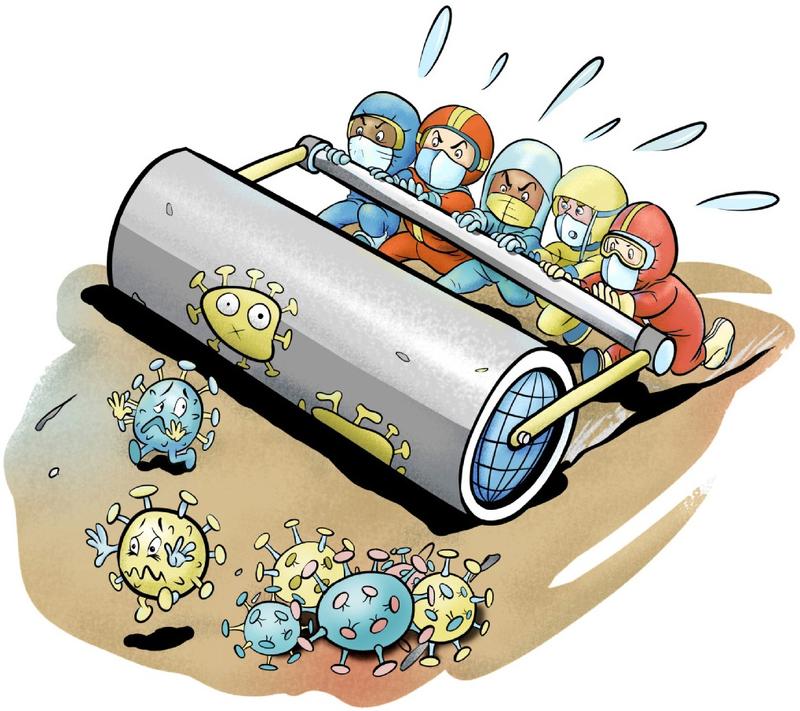 (MA XUEJING / CHINA DAILY)
(MA XUEJING / CHINA DAILY)
The continuing politicization of the novel coronavirus by some countries has undermined global cooperation in the fight against the global public health crisis. Yet despite the difficulties and uncertainties, some countries, including China, have been able to contain the virus at home.
Undoubtedly, people's health is a priority and must remain so at multiple levels. But since the socioeconomic impacts of the pandemic are yet to be overcome-in fact, they could last long-countries, by making post-pandemic interventions and further deepening cooperation in the fight against the virus, can minimize the effects of the outbreak.
Accordingly, the just-concluded Fifth Plenum of the 19th Communist Party of China Central Committee reiterated the importance of containing the virus for the international community and the global economy, not least because by doing so, China has been able to resume near normal economic activities.
China’s conscientious reflection on the values and effectiveness of public diplomacy has helped it to devise measures that have been instrumental in containing the virus
Besides, China has adhered to effective public diplomacy, which has also helped other countries to combat the health crisis.
From soft power interventions to global action plans, China has successfully implemented its public diplomacy during the pandemic. When the World Health Organization declared the novel coronavirus outbreak a public health emergency of international concern on Jan 30, China reviewed the situation anew, and highlighted the effective control and safety measures, instilling confidence in the public about the Chinese government's ability to deal with the outbreak. The mutual trust between the people and the government has been strong since the early days of the epidemic and is a key factor why the authorities have managed to contain the virus in the country. On the other hand, many countries are still struggling to cope with the pandemic.
Even during the global health emergency, China's public diplomacy has been successful on many fronts.
First, the government publicized the construction of two emergency makeshift hospitals in Wuhan, Hubei province, at a time when the country was celebrating Spring Festival. Starting on Lunar New Year day, the live reporting of the hospitals' construction reflected the ability and capability of the government to respond to public emergencies. The timely response to the health crisis, including the completion of the hospitals on schedule, reflected the effectiveness of China's public diplomacy and response to the outbreak in the early days of the outbreak.
Second, thanks to the government's timely dissemination of information and convincing argument, almost everybody started wearing face masks after infections began increasing in Wuhan. And the countrywide use of face masks convinced people that everyone was facing a serious health emergency.
Third, the government implemented lockdown measures first on Wuhan and then on its parent province of Hubei, along with other anti-outbreak measures to prevent the virus from spreading to other parts of the country. Although many Western politicians and media outlets then criticized the lockdowns and the other strict measures as "draconian measures", they realized the importance of China's farsighted moves later, but by that time is was too late for them to effectively implement the same measures in their own countries. Many countries did lock down cities and regions later to prevent and control the spread of the virus-but could not get the same result because of the vital delay in taking action.
Fourth, the support Chinese nationals working or studying abroad extended to their fellow citizens back home came as a sweet surprise for many. While many in the United States labeled this as China's "donation diplomacy", in essence it highlighted the effectiveness of China's public diplomacy and reminded people that even the simplest of gestures during emergencies could produce remarkable results.
And fifth, despite being among the global leaders in the race to develop COVID-19 vaccines and despite two of its candidate vaccines going into phase-III trial, China has vowed to make any vaccines it develops global public goods, and keep their prices reasonable so people in other countries could afford it. This could help defuse some of the international tensions, reflecting the importance of China's public diplomacy worldwide.
China's conscientious reflection on the values and effectiveness of public diplomacy has helped it to devise measures that have been instrumental in containing the virus. However, since the fight against global emergencies will not end even if effective COVID-19 vaccines are developed and made available to the public globally, all countries need to apply similar methods to their foreign policy, in order to strengthen global institutions and improve the global governance system so they can better respond to future pandemics.
Ali Cheshmehzangi, head of the Department of Architecture and Built Environment at the University of Nottingham Ningbo, China, is the author of The City in Need, which is based on the COVID-19 pandemic. And Su Zhaohui is a postdoctoral fellow at UT Health San Antonio in Texas, US.
The views don't necessarily reflect those of China Daily.


